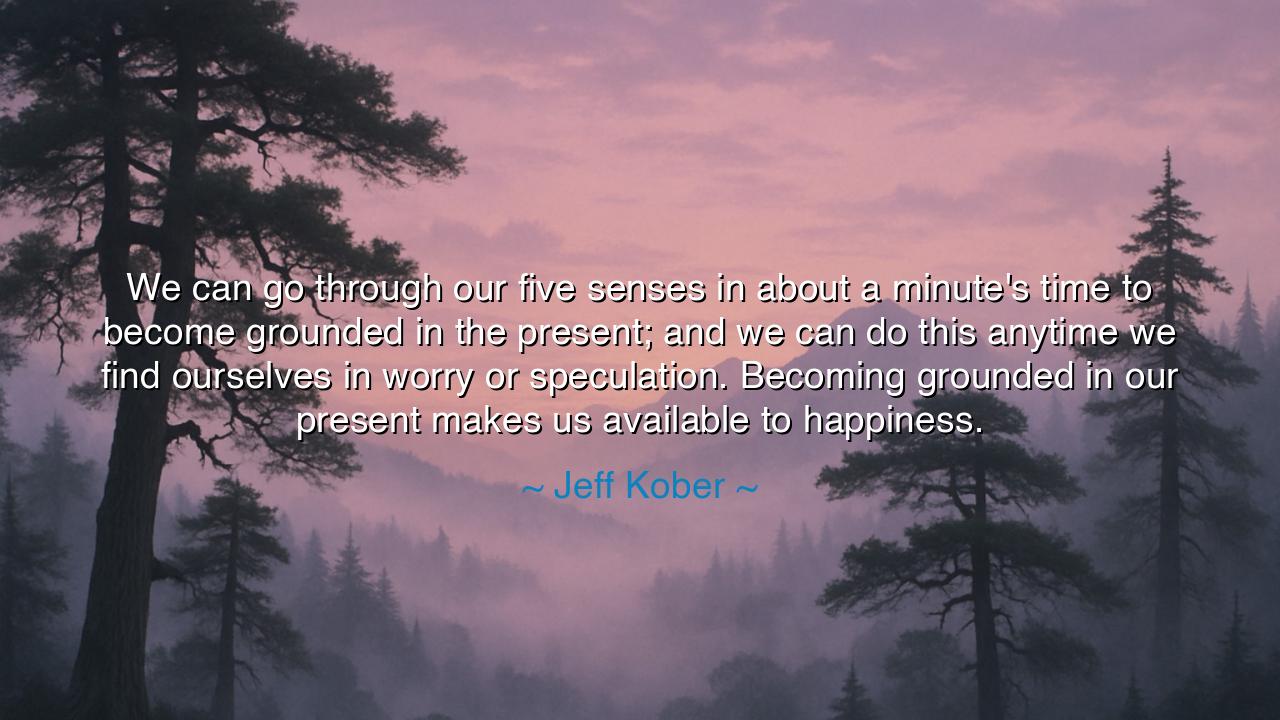
We can go through our five senses in about a minute's time to
We can go through our five senses in about a minute's time to become grounded in the present; and we can do this anytime we find ourselves in worry or speculation. Becoming grounded in our present makes us available to happiness.






Hear the gentle yet profound wisdom of Jeff Kober, who spoke these words as one who understands the restless tides of the human spirit: “We can go through our five senses in about a minute’s time to become grounded in the present; and we can do this anytime we find ourselves in worry or speculation. Becoming grounded in our present makes us available to happiness.” Within this simple practice lies an ancient and eternal truth — that peace is not found in the future, nor in the memory of the past, but in the stillness of now. It is a truth known to sages, mystics, and poets across the ages: that the soul’s greatest suffering comes from its wandering, and its greatest healing comes from its return to the present moment.
The origin of these words rests in the teachings of meditation and mindfulness, yet their essence predates both — reaching back to the earliest wisdom of humankind. Jeff Kober, an actor and spiritual teacher, has long explored the unity between daily life and spiritual awareness. His message, though modern in voice, draws upon timeless insight: that the five senses — sight, sound, touch, taste, and smell — are not distractions, but doorways. They are the gateways through which the spirit returns from the labyrinth of thought into the clarity of being. To walk through them consciously is to anchor oneself in reality, to reclaim the mind from its flights of anxiety, regret, or desire.
The ancients, too, knew this practice. The Stoics spoke of it as the discipline of presence; the Buddhists called it mindfulness; the mystics of every faith recognized it as prayer without words. For in truth, the present moment is the only realm where life unfolds. The past is but a shadow remembered; the future, a dream imagined. When one’s thoughts linger too long in either, worry takes root and speculation blossoms into fear. But when one returns to the senses — to the feel of breath upon the skin, the rhythm of the heartbeat, the scent of the air, the sound of a bird’s cry — one remembers that one is alive. The soul, no longer scattered across time, becomes whole again.
There is a story of Marcus Aurelius, emperor and philosopher, who, though surrounded by war and the weight of empire, wrote in his Meditations: “Confine yourself to the present.” Each day, as troubles mounted and decisions loomed, he reminded himself that serenity could not be found in imagining what might happen, but only in meeting what is with calm and attention. He, like Kober, knew that peace begins in perception. Even an emperor — surrounded by power, wealth, and uncertainty — found his refuge not in control, but in awareness. To live grounded in the present is to hold dominion over oneself, and this mastery is greater than any throne.
Yet how easily, even in simple lives, do we drift away from this truth. The mind leaps from memory to desire, from regret to anticipation. We replay old hurts, rehearse imagined futures, and in doing so, we miss the life that is unfolding before us — the small miracle of the now. Kober’s wisdom offers a remedy that requires no ritual, no temple, no wealth. To pause for a moment and awaken the five senses — to feel the air, to listen deeply, to truly see what is around you — is to step back into the sanctuary of reality. It is as if the world itself, long waiting for your attention, finally exhales in relief.
The secret that Kober reveals is that happiness is not a treasure hidden in the distance, but a presence that awaits our attention. To be available to happiness is to make space for it, to clear the clutter of thought that blocks its arrival. When you are grounded in your senses, even the simplest act — drinking water, feeling sunlight, hearing laughter — becomes luminous. The body and mind align, and the heart opens naturally. This is why the mystics smile quietly and the wise grow gentle: they do not chase joy; they allow it.
Let this then be your lesson, O seeker of peace: when the storm of thought rises, return to the earth beneath your feet. When your mind races ahead into fear or back into sorrow, stop, breathe, and awaken your senses. Ask yourself — what do I see, what do I hear, what do I feel, taste, and smell? Let these anchors pull you home to the present moment, for there alone dwells truth. There, happiness awaits — not as an achievement, but as a natural state of being.
Thus, remember Jeff Kober’s gentle wisdom: to be grounded is not to escape life, but to finally meet it — fully, humbly, gratefully. When you live in the present, every breath becomes a prayer, every heartbeat a reminder that existence itself is the greatest gift. For the past cannot be changed, and the future cannot be known, but the present — this fleeting, sacred moment — is eternity in disguise. Guard it, cherish it, and through it, you shall find the quiet joy that no storm can take away.






AAdministratorAdministrator
Welcome, honored guests. Please leave a comment, we will respond soon